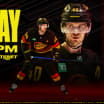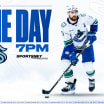The Power of Canucks Twitter
How this fanbase's online antics prevailed, despite everything.

It was like one of those rides at Disneyland designed to go forward and backward, except it malfunctioned and it just kept teetering back and forth. Also, the people in line for the same ride were yelling out suggestions of what they should and should not do, as if it had any effect on the machinery. And, the operator was on TikTok, watching a familiar hockey player accidentally roundhouse kick his wife during their wedding, so they couldn't hear the screams.
It… wasn't looking good.
To be fair, all sports teams and fanbases faced an irregular season due to the COVID-19 pandemic. When the 2020 Stanley Cup Playoffs were postponed to the most non-hockey month of August, journalists asked athletes the same question over and over: 'How does it feel to play in an empty arena?'
Players' answers were predictable: They missed the fans in the stands.
But Canucks captain Bo Horvat took it a step further. In April, he displayed his acknowledgement after the team's first commendable win after returning from a COVID-19 outbreak that affected more than half of their roster.
Captain @BoHorvat is missing the #Canucks fans at @RogersArena, but he saluted the fans at home (and the cardboard cutout fans at the rink 😂) following last nights victory over the Ottawa Senators. pic.twitter.com/HzMJfFF4No
— Vancouver Canucks (@Canucks) April 25, 2021
He turned towards the cameras, lifted his stick, and thanked a crowd that wasn't physically present. Despite various hardships within the organization, he saluted the fans watching at home and engaging online.
In an interview, Horvat thought the cameras wouldn't catch the gesture but was grateful they did.
"We know they're cheering from home, but we want to see them back in the building as soon as possible … When you win a game in front of your fans, there's no better feeling."
These quotes, accompanied by that brief clip of him confidently gazing into the camera, shattered the fourth-wall of plexiglass that divided fans and players online.
It emphasized how valuable social media has become, especially the case during an unprecedented season.
Taking one stroll around Rogers Arena on a gameday, it's easy to understand of what Horvat and other hockey players are playing without. The absence of human reaction. The lack of a responsive roar when the puck pinged off the goal post. That constant hum during stoppages in play. A mutual, futile wish for both fans and players in the Canadian division is to return to that boisterous environment of a sports event, as most of the American-based teams allowed a controlled capacity into their arenas in the latter portion of the season.
The mini-hordes of cardboard cutouts everyone saw on TV were, indeed, inanimate and dispirited. Mikko Koskinen's stick taps were blundering loud. The artificial cheering was often drowned out by incoherent yelling, bodies slamming into the boards, and sharp skating sounds.
Most of all, Rogers Arena felt hollow.
But the Canucks fanbase made sure to show up in a digital setting, as they did in previous years and as the late Jason Botchford embraced when writing The Provies and The Athletties. He placed fans at the forefront of his analyses, a rule of thumb that most traditional journalists never considered. Admittingly, Canucks Twitter is hard to miss by other NHL fanbases, media members, and the athletes themselves.
"There's a sense of pride with the team that this fanbase has and you can definitely see that on social media for sure," Zack MacEwen agreed.
Pride was clearly evident when his mother, Juliana, constantly supported him online, as hockey moms should. She even retweeted a Fancam of her son, a fan-made video edited with music and featuring clips of the creator's favourite singer, actor, or in a sports fandom sense, team or athlete. It is becoming a popular promotional method used in social media strategy and, overall, an entertaining form of appreciation.
"Yeah," MacEwen smiled sheepishly, letting out a little laugh. "She likes to get involved in that. I tell her to pump the brakes a little bit, but I think it's a good way for her to stay connected."
Indeed, Canucks Twitter also teaches and reminds both new and jaded fans about the team and its history. Where else can users watch a video of rookie Alex Edler dancing in the 2008 Dice & Ice Gala, then scroll to a heated debate on the ethics of viewing a player's public Spotify playlist, then hold back tears to a tribute video of the Sedin retirement ceremony?
Alas, the Canucks Fan Experience isn't always a walk in the park. There's bound to be vitriol and valid opinions about individual player performance and the team itself, inevitable on such a viral digital platform.
"There's always some negativity that you see and don't see and that's just part of life and the game," MacEwen indicated. "Anytime you hear that, you kind of take it with a grain of salt. You can use that to fuel you. I've taken pride in trying to prove a lot of people wrong my whole life, and I'm gonna try to keep doing that and continue to make that part of who I am."
Each player faced some form of adversity and critique in their careers, but the Canucks' 2020-21 season seemed to accumulate hardship after hardship, even excluding the outbreak. From reverse retro jersey debates to trade deadline arguments, how could the same fanbase that came together to follow Elias Pettersson's universally-acclaimed offseason continue to pit themselves against each other?
It's simple, really: Canucks Twitter is one of the most active and polarizing online communities in the NHL. The recent divided discourse is, ironically, what brings the fanbase 'together'. Their concerns demonstrate what being a true fan is: wanting the best for your favourite team, regardless of the situation.
On May 3rd, this was illustrated in a turbulent home game against the Oilers.
Late in the second period, Connor McDavid plucked the puck at the blueline, and you can guess what happened next. I watched his quick shot pass through a desperate Braden Holtby and the puck painfully trickled into the net. Like clockwork for this year's point-leader, who would reach his 100-point milestone within a shortened season a few games later against, you already know who, the Canucks.
I bitterly ripped my eyes away from the Oilers' congratulatory huddle and knew what I'd be opening my Twitter timeline to: disappointment, misery, and the occasional 'It's McDavid, what can you do?'
EDM@VAN: Boeser powers home a wrist shot
In the third period, Brock Boeser took a wrist shot after a clean faceoff win, tilting the ice in the Canucks' favour and putting the team within one goal of tying the game.
The goal horn shook the arena, smoke pumping out of the video board, and I heard several exclamations behind me. Once the goal horn faltered, the energy fell back into an awkward standstill. The players reset at centre ice, and the puck was dropped like nothing happened.
Then, I turned my phone on, and my timeline was still buzzing.
'Boeser!'s typed out in unison, siren and heart emojis sprinkled around, retweets of his goal video from the official Canucks Twitter account. That familiar rush that got my heart pumping blood faster than it was programmed to do. I visualized a frenzied crowd waving their towels in the air, cheering long after the goal.
Both of these contradictory feelings combine as the Canucks Fan Experience, and it was carried over to Twitter.
It's finding amusement in hearing the routine 'Woop!'s from Nate Schmidt, or natural expletives from J.T. Miller. It's the collective proposals for Nils Höglander's umlaut addition to his jersey, eventually coming to fruition. It's befriending international Canucks fans in Australia and Finland, who commit to watching the games early in their days.
It's so much more than watching a rubber disk roll past a goalie.
Sometimes, I think back to times where Canucks Twitter exploded… in a good way. Höglander deserved to hear the crowd go absolutely nuts when he attempted a few lacrosse goals. Brandon Sutter's first career hat trick in January should have been surrounded by a jumping sea of blue and green. Olli Juolevi and Jack Rathbone's first NHL career goals were entitled to a welcoming, ear-splitting crowd.
Moments of priceless harmony within this fanbase, confined to words and images on a screen. But celebrated just as enthusiastically as they would've been in person.
Canucks fans will show up for this team, regardless of circumstances and barriers, such as a literal global pandemic. That's the way hockey in Vancouver was, and is, and always will be, according to Botch.
Didn't we all pay for this rollercoaster ticket to have fun?


















